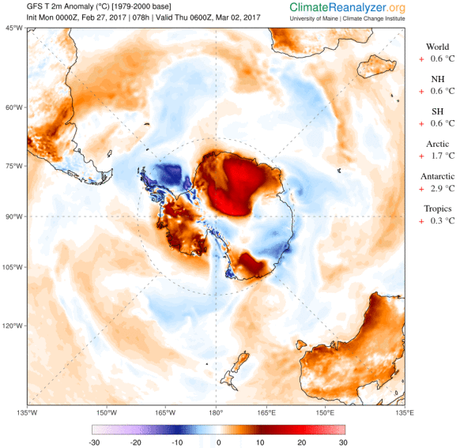GR: Here’s an update on climate-change developments in Antarctica. As in the Arctic, sea ice is melting. Losing sea ice increases solar heat absorption by open water and changes pressure systems. If this accelerates as it has at the North Pole, we have one more factor contributing to wildfires, weather extremes, and impacts on wild plants and animals.
“During late February, Antarctic sea ice breached the previous all-time record low for extent coverage since measurements began in 1978. And in the following days, sea ice extent measures near the South Pole have continued to creep lower, gradually extending into unprecedented ranges.

More above average temperatures predicted this week for Antarctica may extend sea ice record lows somewhat before refreeze sets in. Image source: Climate Reanalyzer.
“Hitherto unseen global heat — driven primarily by human fossil fuel emissions — appears to be the chief contributor to this melting. During 2016, global average surface temperatures rose to 1.2 degrees Celsius above 1880s ranges. This global reading likely represents the warmest surface temperatures the world has experienced in the last 115,000 years. At the same time, the global ocean system has been rapidly accumulating warmth and transferring it through the surface and deep layers of the world’s waters.
“Such pervasive heat is producing an ongoing trend of considerable sea ice melt in the Arctic — a trend that has been in place since record-keeping began in 1978. One that, all by itself, is strong enough to drag global sea ice measures lower and lower. The warmth is also producing land ice melt around the world — including glaciers in Antarctica, Greenland and across numerous mountain ranges.” –Robert Scribbler (Continue reading: Antarctic Sea Ice Hits New All-Time Record Low | robertscribbler.)

Global warming produced an identifiable global sea ice melt trend during the post year 2000 period. By 2016, that trend had become glaringly obvious. See final paragraph for further discussion. Image source: Wipneus.

